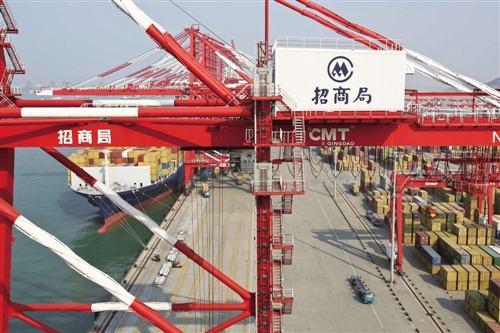
BEIJING, Sept. 14 (Xinhua) -- China Merchants Port Holdings Co., Ltd. (CMPort) announced that it has acquired 90 percent shares of TCP Participações S.A. (TCP), operator of the second-largest port in Brazil, for 7.228 billion Hong Kong dollars (about 6.026 billion yuan).
As China’s largest port operator, CMPort carries out terminal operations across the country. The company, which already boasted a comprehensive network in China’s key coastal ports, has now entered the international market.
On September 4, CMPort, via its wholly-owned affiliate, Guangsheng Development Group Incorporated, entered into a share purchase agreement with TCP to acquire the Brazilian Paranagua Port. It cited “internal resources and external debt financing” as its capital source for the acquisition.
TCP operates Port of Paranagua, Brazil. Located in Paranagua in Brazil’s southeastern coast, the port is Brazil’s second-largest container terminal and the region’s only container port. Home to 45 percent of Brazil’s population, the port’s economic hinterland takes up 48 percent of Brazil’s national income.
As of June 30, TCP’s total assets and net assets stood at 8.042 billion HK dollars and 4.069 billion HK dollars, respectively. Calculated by net assets, the acquisition premium was 97.37 percent. TCP had posted a net profit of 127 million HK dollars after tax in 2015 and a loss of 19.885 million HK dollars in 2016.
The strategic value of TCP’s acquisition perhaps outweighs its profit prospects for CMPort. According to CMPort, the acquisition will further consolidate its global status as its overseas port operations extend from South Asia, Africa, North America and Europe to Latin America.
Moreover, CMPort can capitalize on TCP’s shipping hubs to develop its logistics network, import and export, industrial zones, potential housing projects and relevant financial service platforms, thereby enhancing its internal business synergy.
With a designed annual handling capacity of 1.5 million TEUs, TCP and its affiliated company are mainly engaged in the port’s container terminal operation business. Meanwhile, an extension plan has been worked out for the port and will be initiated later this year. Expected to complete in the second half of 2019, the extension project will increase the port’s annual handling capacity to 2.4 million TEUs.
Although the acquisition seems pricy measured by net assets, it was the right time for the acquisition. “I believe that the price could have been further negotiated, given that the terminal is in the black and emerging markets like South America and Africa feature relatively low acquisition prices with few competitors,” said Xu Jianhua, a professor of Shanghai Maritime University.
“Ports in emerging markets have some disadvantages despite low acquisition prices. First of all, with backward demands, these ports cannot necessarily meet expectations. Secondly, with inferior infrastructure, heavy investment is probably needed for future reconstruction or extension,” he added.
(Edited by Yang Qi, kateqiyang@xinhua.org; source: 21st Century Business Herald)




 A single purchase
A single purchase









